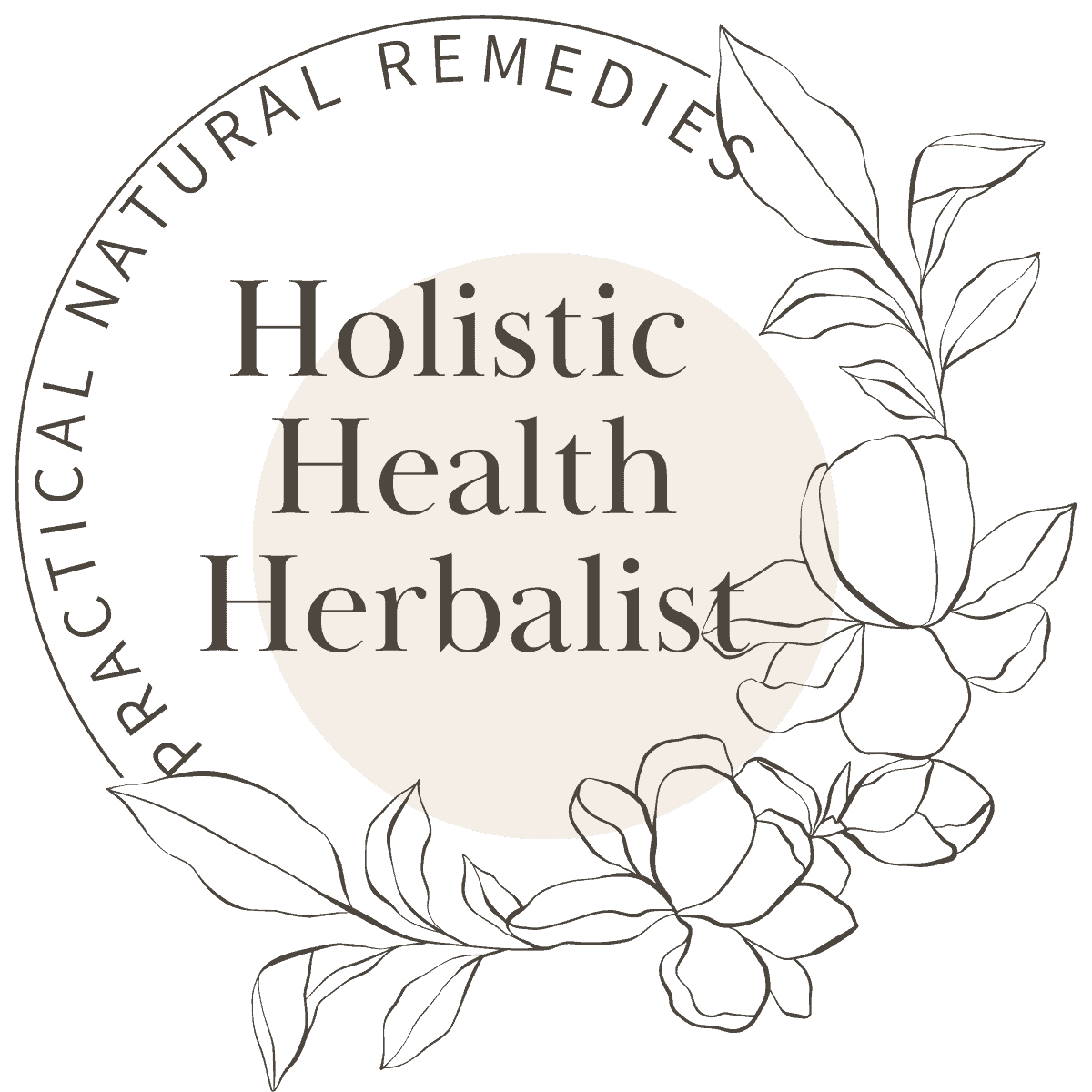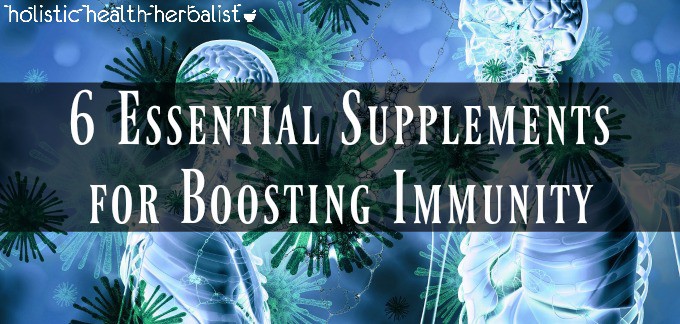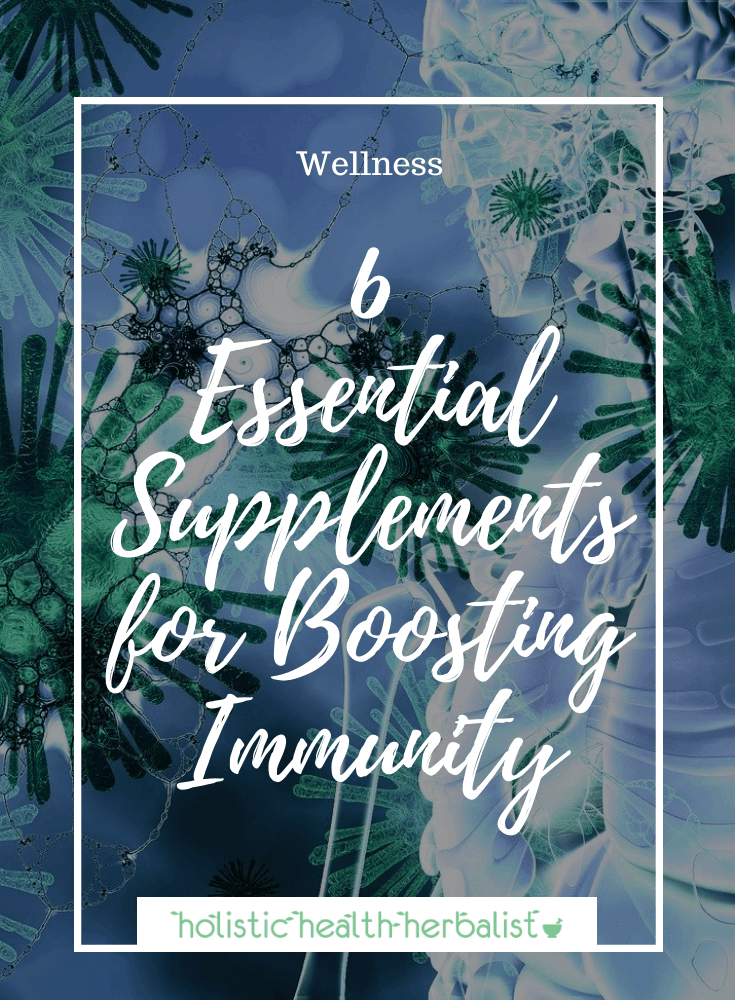Since we’re all hyper-aware of what’s going in the world, I thought it prudent to provide an easy and to-the-point guide on supplementing during these uncertain times. With the onslaught of information circulating on every news platform and social media outlet, it’s no wonder we’re all feeling a little overwhelmed.
Thankfully, boosting your immunity and supporting your family’s wellness even during times like these is less complicated than you think! It all comes back to identifying your deficiencies and topping up your body’s stores of vital nutrients.
***NOTE:
All sources are listed at the bottom of this article.
If you have trouble finding the supplements listed, try iherb.com
How to Boost Immunity with Supplements
Most people, especially those who follow the Standard American Diet, are deficient in many of the same nutrients.
This is due to the fact that most Americans fail to consume a balanced nutrient-dense diet that’s full of fresh fruits and veggies, lean meats and oily fish, and high-quality dairy.
I get it. It’s easy to just stick a rotation of weekly meals. You’re a busy mom, you work long hours, or maybe these foods simply aren’t available where you live.
However, that doesn’t mean that your body will just magically produce the nutrients you need when you aren’t consuming them through your diet.
That’s where supplements come into play. They help “supplement” your diet and restore the proper levels of vital nutrients.
Right now, it’s more important than ever to have a protocol in place to help support you and your family's health.
Below is a list of 6 essential nutrients you NEED in order to give yourself and your family the best boost in immunity possible for dealing with this virus.
Getting topped up on these nutrients can help lessen the severity of symptoms and even help your body to better protect itself against catching it because your immune system will be properly fueled and ready for action.
It all comes down to how strong your immune system is.
Here are the 6 most important supplements for boosting immunity:
1. Omega-3 (1,000-3,000 mg daily)
Omega-3 fatty acids like those found in DHA and EPA-rich fish oil have been found to boost the immune system by enhancing the function of immune B cells. B cells, also known as B lymphocytes, are a type of white blood cell that bind to foreign substances (like viruses) and induce an immune response in the body. This encourages the body to produce antibodies that then deal with the threat.
Omega-3 fatty acids also have an amazing ability to reduce inflammation in the body and help regulate the production and release of cytokines in macrophages.
In case you didn’t know, cytokine storms are a huge topic right now. A cytokine storm is defined as an overproduction of immune cells and their activating compounds (cytokines), which, in a flu infection, is often associated with a surge of activated immune cells into the lungs.
This can cause a severe immune overreaction known as a “cytokine storm” that can further sicken and even kill individuals infected with certain strains of flu.
Omega-3 fatty acids are able to help suppress and modulate this overreaction.
Here are my favorite high-quality fish oil supplements to consider:
- Carlson -The Very Finest Fish Oil
- New Chapter Wholemega
- Nordic Naturals Nordic Omega-3 Gummies for kids
- Nordic Naturals Ultimate Omega
Take 1,000-3,000 mg daily.
2. Selenium (200 mcg daily)
Selenium helps regulate oxidative stress, redox, and other crucial cellular processes in nearly all tissues and cell types, including those involved in innate and adaptive immune responses.
The innate immune system includes barriers to infection and nonspecific effector cells like polymorphonuclear cells (mainly neutrophils), mononuclear phagocytes (monocytes/macrophages), and natural killer cells. The adaptive immune system includes major effector cells such as T and B lymphocytes.
An effective immune response requires a coordinated interaction between both the innate and adaptive immune systems and having adequate nutrition levels is critical for this coordination to occur.
One of the most compelling benefits of taking selenium is its ability to elevate antiviral immunity and its effect on the body’s immune response to viruses.
Having low selenium levels has been associated with slower immune response and reduced levels of T cell counts and reduced antibody response.
This is why it’s important to supplement with selenium when colds, flu, and viruses are prevalent.
My favorite ways to supplement selenium include:
- Eating raw unsalted brazil nuts every day (just one brazil nut contains 68-91 mcg of selenium which is over the 55 mcg recommended daily dietary intake)
- Solgar Selenium tablets 200 mcg
3. Vitamin C (500-1,000 mg daily)
It is well known that Vitamin C is one of the best nutrients to top up on for cold and flu season, and for very good reason. Both phagocytes and T cells can actually accumulate stores of this essential nutrient and use it to enhance their resistance against certain pathogens.
Taking Vitamin C also increases natural killer cell activity and lymphocyte proliferation while maintaining the redox integrity of cells. This helps protect the integrity of immune cells since phagocytic leukocytes release toxins like superoxide radicals, hypochlorous acid, and peroxynitrite in order to kill pathogens which, interestingly enough, can also damage the immune cells themselves.
Since Vitamin C is a potent antioxidant, it helps protect leukocytes from damage and, in turn, helps reduce the duration and severity of the common cold and upper respiratory infections.
My favorite Vitamin C supplements include:
- Ester-C 1,000 mg tablets
- Terrasoul Camu Camu Powder (great to add to smoothies)
- Thorne Research Vitamin C with Flavonoids 500 mg
4. Vitamin D (4,000 – 7,000 IU daily)
Vitamin D is another vital nutrient that has demonstrated immunomodulating effects that help prevent respiratory infections. Taking even 400-2,000 IU daily has been proven to reduce the occurrence of respiratory infection while taking 4,000 IU daily can significantly reduce the chances of contracting respiratory infections.
The fact that the current virus seems to have a strong correlation between sun exposure and infection rate suggests that correcting a Vitamin D deficiency up-regulates the body’s antimicrobial immunity while also reduces the production of pro-inflammatory cytokines.
This is really important since pneumonia, ARDS (acute respiratory distress syndrome), and a possible “cytokine storm” in the lungs is what we really need to worry about concerning the current virus.
As soon as you notice symptoms, I suggest taking 4,000 IU of Vitamin D daily until symptoms are gone. It will at least give your immune system a good boost and help keep the virus out of your lungs as much as possible.
My favorite Vitamin D supplements include:
- Doctor'S Best Vitamin D3 5,000 IU
- Garden of Life Vitamin D3 2,000 IU
- Jarrow Formulas Vitamin D3 2,500 IU
5. Vitamin E (100-200 IU daily)
When it comes to immune support, you may not think about Vitamin E. However, this lipid-soluble antioxidant plays a key role in protecting the integrity of cell membranes, including those of immune cells, from free radicals.
Vitamin E does this by reducing the peroxidation of polyunsaturated fatty acids, which is known to cause cellular damage and lead to improper immune response.
Having a deficiency in Vitamin E has been shown to impair humoral and cell-mediated aspects of adaptive immunity including both B and T cell functionality.
Taking 100-200 mg of Vitamin E daily over a three-month period can significantly improve natural killer cytokine activity, neutrophil chemotaxis, phagocyte response, and overall immune function.
One study has shown that taking Vitamin E for one year significantly reduced the risk of contracting a respiratory infection.
You can get Vitamin E here:
6. Zinc (25 mg daily)
Zinc is critical for the normal development and function of both innate and adaptive immune cells. Since the body does not store zinc, we must make sure to consume adequate amounts daily in order to avoid a compromised immune system.
If we become deficient in zinc, innate immune cells like natural killer cells, phagocytes, neutrophils, and macrophages begin to lose their ability to kill invading pathogens effectively.
Zinc deficiency also compromises adaptive immunity with T cells being the most vulnerable. Additionally, having even a marginal zinc deficiency can lead to increased oxidative stress and inflammation in the body.
When taken during a pneumonia infection, zinc has been shown to decrease pneumonia-related mortality.
Since pneumonia is one of the reasons for hospitalization in regards to the current virus, it’s definitely worth making sure that you and your family are getting enough daily.
Here is where you can get zinc:
Again, if you have trouble finding the supplements listed, try iherb.com
You may also enjoy reading:
List of Herbal Sources in the USA and Canada
25 Herbs for Upper Respiratory Infections
Quarantine, Sheltering in Place, and Trying Times – What I’m Doing
Immune Boosting Blend for Colds and Flu
Sources:
Editorial: Fat chance to enhance B cell function
Effects of Omega-3 Fatty Acids on Immune Cells
Dietary Selenium in Adjuvant Therapy of Viral and Bacterial Infections
The influence of selenium on immune responses
Selenium, immune function and resistance to viral infections
Immune-enhancing Role of Vitamin C and Zinc and Effect on Clinical Conditions
Vitamin D and the Immune System
Vitamin E ingestion improves several immune functions in elderly men and women.
The significance of zinc for humoral and cellular immunity
This post contains affiliate links. We are a participant in the Amazon Services LLC Associates Program, an affiliate advertising program designed to provide a means for us to earn fees by linking to Amazon.com and affiliated sites. Read my full disclosure and disclaimer.







Leave a Reply